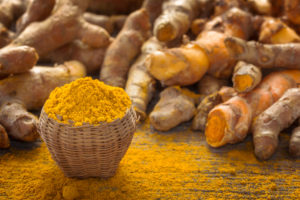Written by Patrick B. Massey, MD, PH.D. The ancient spice turmeric is a powerful anti-inflammatory with many health benefits including reduction of the inflammation and pain associated with osteoarthritis.
 Can an ancient spice have an impact on a chronic medical condition that causes pain and disability to millions of Americans each year? The answer is yes and that spice is turmeric.
Can an ancient spice have an impact on a chronic medical condition that causes pain and disability to millions of Americans each year? The answer is yes and that spice is turmeric.
Over the past two decades there have been many medical studies evaluating the effect of turmeric extracts including curcumin and reducing the pain and inflammation associated with osteoarthritis.
The overall results of these studies strongly indicate that curcumin and other extracts of turmeric reduce inflammation as well as pain levels in patients with osteoarthritis.
Osteoarthritis is not a new medical condition. Indeed, the archaeological record has shown that even the ancient dinosaurs suffered from osteoarthritis. It seems to be a price that we pay for having movable joints in our bones.
Osteoarthritis is a chronic medical condition related most often to lifestyle. Joint injury, obesity and physical activities that create a lot of stress on the joints will predispose a person to developing osteoarthritis.
Many of these activities also produce a chronic inflammation of the joint and surrounding tissues. The end result of this activity is a breakdown of the cartilage in the joint and some of the underlying bone.
The most common symptoms include pain and swelling in the joint area as well as stiffness. Later there can be actual damage to the tissues of the joint itself.
In the United States, osteoarthritis is incredibly common affecting almost 55 million people, and almost 50 percent of those are 65 and older. The medical cost of osteoarthritis is astounding. According to the Centers for Disease Control, in 2003 the direct medical costs for osteoarthritis was over $80 billion. In direct medical costs such as lost wages constituted another $47 billion. It has been estimated that with the aging population these medical costs will probably double by 2040.
A recent study published in the Journal of Medicinal Food demonstrated that extracts of turmeric have a significant impact on the inflammation and pain associated with osteoarthritis. The study was a meta-analysis, which means that it combined the data from many smaller studies and the final result indicated that an ancient spice is very effective at reducing the inflammation and associated symptoms of osteoarthritis.
This meta-analysis included middle-aged and elderly people who have symptoms of osteoarthritis in five or more joints. All of the studies demonstrated a significant reduction in pain and stiffness. They also concluded that approximately 1000 mg of curcumin a day gave a reduction in symptoms equivalent to over-the-counter analgesics.
This is important because turmeric extracts and curcumin do not have the same gastrointestinal and heart-related side effects (bleeding, high blood pressure and increased risk of heart attack) associated with commonly used pain medications. The side effects seem to be increased in the elderly — the very people most affected by osteoarthritis.
From my perspective, the future of medicine is not more medications but reducing the need for the chronic use of medication by incorporating safe and effective nontraditional therapies like turmeric and curcumin.
- Patrick B. Massey, MD, PH.D., is medical director for complementary and alternative medicine at Alexian Brothers Hospital Network and president of ALT-MED Medical and Physical Therapy, 1544 Nerge Road, Elk Grove Village. His website is www.alt-med.org.
